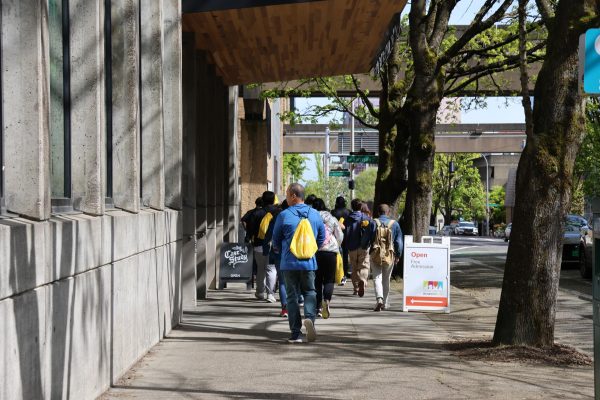AP Classes Don’t Always Provide Concrete Benefits
April 7, 2015
I can still remember the first time I filled out an application for an AP class my sophomore year. I was so proud of my essay, written on the glass ceiling for women in America, that I had spent so much time and effort on perfecting.
When forecasting rolled around, I realized I was fortunate enough to qualify for both of the AP classes I had applied for. AP Government and AP United States history, two of my favorite subjects. I happily checked both boxes on my forecasting sheet and thought nothing of it until I went to an informative meeting on the summer homework for these advanced classes.
In the meeting, they told us about the reading, notecards, essay drafts and other miscellaneous things we would be expected to bring in next September for these classes. It was overwhelming, sure, but nothing a student like me or my peers couldn’t handle.
Fast forward to that September of my junior year (which was at a different school than La Salle). I had spent much of August in between my work shifts trying to annotate “A People’s History of the United States by Howard Zinn”, laying in the sun while trying to finish concept cards on the American Revolution and staying up until midnight on rough drafts of responses to hypothetical AP test questions. In August. School hadn’t even begun and I was already stressed about a test that was happening in May.
As the year went on, I noticed myself falling into a cycle. Read 2-4 chapters of the textbook as homework, listen to a lecture during class, study for a test that was very difficult to pass, and repeat. At the time, I assumed the teacher was preparing us for the test in the most effective way that he knew how, so I never stopped and asked about the process that I had fallen into.
And in May, I discovered that he had prepared us for the test. Most of the students in my class passed, myself included. The test was filled with questions we had seen before and with essay questions we had written on. But in the following weeks, when I was discussing prompts with my friends, I became a little disheartened at the fact that the ideas and concepts I thought I had learned were fuzzy in my memory. What was the battle of Bunker Hill? What did PAC stand for? What were the factors that could determine people’s voting records?
It wasn’t long before I realized that to me, the AP classes I had taken that year were nothing more than a memorization for a grade scheme, something I thought I would get out of by being in “advanced placement” level classes. Overall, taking AP classes hadn’t been worth the stress that they had caused me, to get out and remember minimal amounts of information, with a mediocre test grade.
The concept of AP is for advanced level students to have the chance to gain college credits while still in high school. However, this is a system that seems to me to be quite outdated. Most colleges won’t accept anything lower than a 4 (and rightly so, I would argue that only a 4 or higher shows mastery of the material), and some will mandate you to retake the class regardless of the score you get, especially if it’s in your major subject area.
So why bother taking or offering AP classes? I can see that theoretically, there are beneficial aspects of AP. If your teacher is dedicated to you learning the material and not memorizing it, it can be an experience where you gain a college level understanding of material as only a junior or senior in high school. In several cases, I have been privileged to have teachers who deeply care about the material. For example, in AP English this year, we have delved into books and themes beyond what will appear on the test, and I see that as an example of an AP class that was not “teaching simply to the test”. This is a beneficial result that I have seen in practice, which sways me to be a little more in favor of AP classes.
However, in practice, if you don’t know a lot about the subject, it can be difficult to begin at a fast-paced level. I was very limited on my prior knowledge of U.S. history, and that became very apparent when other students could name all of the presidents of the United States and I could name around six. The information that you learn hardly has time to sink in before you move on to the next subject or a more complex idea. The added stress of not understanding something and not having any extra time to process it is very taxing.
I also found that despite my teachers’ love for the subject, the idea of having to “teach for a test” often seemed to defeat their passion. It’s not that the teacher isn’t a “good” teacher — it’s simply that the formatting of the AP classes demands them to sometimes lose the “fun” elements of teaching. Lectures are planned in advance because of a methodical teaching formula that needs to be completed in order for students to be prepared for the exams, and there’s little to no wiggle room in the curriculum for genuinely interesting discussion.
So, before you are halfway through the semester in an AP class you may not be prepared to take, or pass the test for, ask yourself if it’s really the right fit for you. With every “hard” class you take, you can anticipate a large workload coming with it, with perhaps little pay off besides a potential pat on the back for a good score on the exam.
While you do want to challenge yourself in school, you don’t want schoolwork that you do not enjoy to utterly consume you and your well being. Advanced placement is just a title, and passing an exam is just a number. There is no letter or number than can replace your understanding of the material being taught in class and the potential to explore beyond a simple “what’s on the test?” approach.
Creative Commons photo from: https://www.flickr.com/photos/100445151@N03/9558406631














